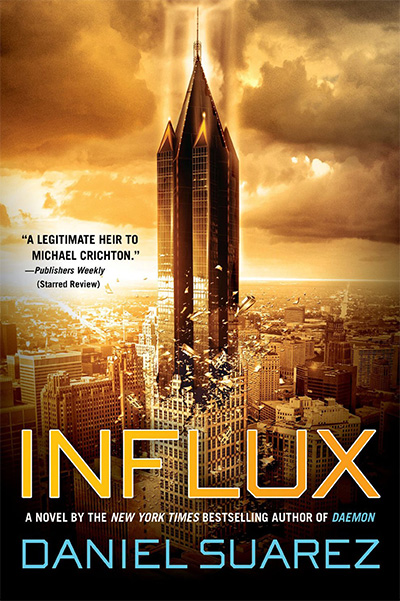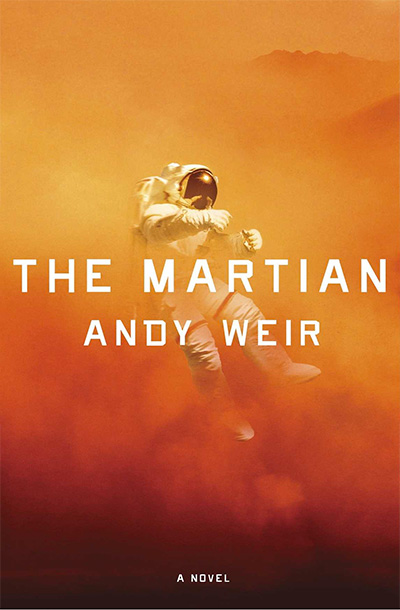I went to see Daniel Suarez and Andy Weir read at an SF in SF event at the Emerald Tablet in North Beach last night. Suarez is one of my favorite authors and has a new novel out called Influx that deals with the authoritarian control of innovation. Andy Weir is a new author whose book, The Martian, has attracted a lot of attention. It’s about an astronaut stranded on Mars and is notable for its adherence to scientific accuracy. Weir, like Suarez, started out self-published, but sold enough copies independently to get picked up by a publisher.
 I am halfway through Influx now and in some ways it continues a central theme found in Suarez’s work. He is is concerned about the way technology can concentrate power into fewer and fewer hands as it progresses. His novel deals with the stagnation of innovation idea by suggesting that innovation has actually occurred, but that it is continually harvested and hidden by a secret government organization that is intent on maintaining social order. He also suggests that an attempt to create superhuman AI capable of innovative insights, but lacking in free will, is an abomination. It represents for him a sort of cybernetic slavery that could put unthinkable power into the hands of a single person.
I am halfway through Influx now and in some ways it continues a central theme found in Suarez’s work. He is is concerned about the way technology can concentrate power into fewer and fewer hands as it progresses. His novel deals with the stagnation of innovation idea by suggesting that innovation has actually occurred, but that it is continually harvested and hidden by a secret government organization that is intent on maintaining social order. He also suggests that an attempt to create superhuman AI capable of innovative insights, but lacking in free will, is an abomination. It represents for him a sort of cybernetic slavery that could put unthinkable power into the hands of a single person.
 I haven’t read Andy Weir’s book, The Martian, but his reading was very compelling. He tells the story of an astronaut stranded on Mars in the form of smart-assed entries into a mission log. Weir is a computer programmer and was obsessed with getting all of the technical details correct in order to make the story scientifically feasible. He credits this adherence to scientific accuracy for providing him with many unexpected plot twists as he thought through the scenario one step at a time. His book has received a good amount of positive press and I look forward to reading it.
I haven’t read Andy Weir’s book, The Martian, but his reading was very compelling. He tells the story of an astronaut stranded on Mars in the form of smart-assed entries into a mission log. Weir is a computer programmer and was obsessed with getting all of the technical details correct in order to make the story scientifically feasible. He credits this adherence to scientific accuracy for providing him with many unexpected plot twists as he thought through the scenario one step at a time. His book has received a good amount of positive press and I look forward to reading it.
During the question and answer period, I brought up Neal Stephenson’s Hieroglyph Project, which is encouraging SF writers to write stories that can inspire the next generation of scientists and engineers to create innovative technical breakthroughs. Suarez was ambivalent about the idea and Weir was frankly opposed to it. In Weir’s view, entertainment should be entertaining and not aspire to social benefit. I found his position interesting because The Martian seems that it would fit quite nicely into the Hieroglyph Project. It appears to be a positive story that highlights the ability of humans to overcome difficult obstacles and also shows the feasibility of humans traveling to and surviving on Mars.
For my own part, I was previously much more skeptical of the impact that science fiction can have on the future of innovation, but I have become more amenable to the idea over time. Technological progress is a story that involves science in a complex dance with economics, politics, and other cultural forces. Even in this scientific era, the stories we share shape how we conceive of reality. Great stories of positive and plausible future outcomes have inspired not just engineers, but also politicians and business people. Utopian stories are justly criticized by Pinker and others, but we do need a common narrative to move in a coherent direction as a society. It may be that storytellers do have an important role to play and need to take up this difficult responsibility.
So much can go wrong in the future and many paths must be avoided, but what directions SHOULD we go in? Our stories can point the way. I haven’t finished Influx yet, so I can’t say in what direction Suarez would point us. Weir offers his own succinct answer: We should go to Mars.

I am curious about this statement:
“Utopian stories are justly criticized by Pinker and others, but we do need a common narrative to move in a coherent direction as a society.”
Can you provide references to such criticisms by Pinker? (I assume “Pinker” refers to Steven Pinker.)
Thanks. -Jon
Steven Pinker made these comments during a discussion with Stewart Brand after his Long Now talk last year. He was referring to the Utopian visions of genocidal dictators from the 20th century.
Check around 69:00 on this podcast: http://canadapodcasts.ca/podcasts/SaltSeminars/3298856
This was actually Pinker with Brand at Long Now in Oct. 2012
Thanks, Scott, both for your quick reply and the link. I listened to the relevant section, and I would have to agree that so-called “utopian” ideologies can lead to unspeakable atrocities in which the ends supposedly justify the means. This is a very complicated issue, needless to say.
Is there an absolute algorithm (ideology) that could guide a sentient being to do the “right thing”? I wonder. In any case, I do worry that the plethora of apocalyptic visions in fiction (print, film and game) are having a corrosive influence on humanity’s future.
My own general optimism about the future was informed in my adolescence by the positive visions of Arthur C. Clarke and, to a lesser degree, by Robert Heinlein and Isaac Asimov. I think optimism can be likened to the placebo effect, but double-blind experiments have shown that the placebo effect can be quite … effective.
I plan to listen to the rest of the recording with Steven Pinker and Stewart Brand later. And I’ve just purchased a ticket to the Singularity conference tomorrow. Thanks again. –Jon
I don’t actually think ideologies are easily described by algorithms. Ideologies are dynamic narratives negotiated between many seemingly autonomous agents.
My understanding of algorithms is that they could be as complicated as the thing that they describe (and therefore not very useful). The real caveat is in the “seemingly autonomous” part. I think that “autonomy” is another way to refer to “free will,” and that can be a very contentious issue indeed.
I subscribe to the idea that we really don’t have autonomy (as in “free will”) because that would imply having the ability to change the course of cause-and-effect in the natural world. By my understanding that would imply something supernatural, and I don’t subscribe to that.
But we do function as if we have free will, and I agree that our “dynamic narratives” would be very hard to describe with an algorithm.
Pingback: Influx by Daniel Suarez: A Preview and Recommendation | Rosemary's Inkpot